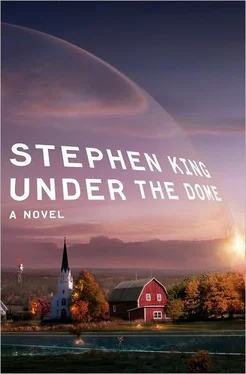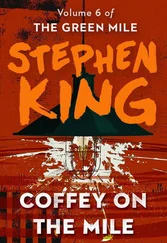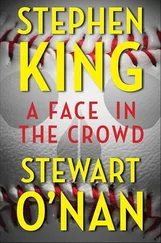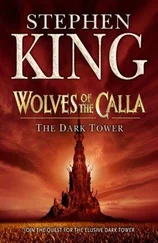Jim Rennie’s lunch, Andrea thought. Which I intend to feed him in front of this whole town.
“I always take my knitting to town meeting. Sometimes they’re just so slow and dull.”
“I don’t think this one will be dull,” Julia said.
“You’re coming, aren’t you?”
“Oh, I imagine,” Julia said vaguely. She expected to be well away from downtown Chester’s Mill before the meeting ended. “I have a few things to do first. Can you get there on your own?”
Andi gave her a comical Mother, please look. “Down the street, down the hill, and it’s right there. Been doing it for years.”
Julia looked at her watch. It was quarter to six. “Aren’t you leaving awfully early?”
“Al will open the doors at six o’clock, if I’m not mistaken, and I want to be sure and get a good seat.”
“As a selectwoman, you should be right up there onstage,” Julia said. “If it’s what you want.”
“No, I don’t think so.” Andi switched the bag to her other arm again. Her knitting was inside; so was the VADER file and the.38 her brother Twitch had given her for home protection. She thought it would serve just as well for town protection. A town was like a body, but it had one advantage over the human one; if a town had a bad brain, a transplant could be effected. And maybe it wouldn’t come to killing. She prayed it wouldn’t.
Julia was looking at her quizzically. Andrea realized she’d drifted off.
“I think I’ll just sit with the common folk tonight. But I’ll have my say when the time comes. You can count on that.”
Andi was right about Al Timmons opening the doors at six. By then Main Street, next to empty all day, was filling with citizens headed for the Town Hall. More walked in little groups down Town Common Hill from the residential streets. Cars began to arrive from Eastchester and Northchester, most filled to capacity. No one, it seemed, wanted to be alone tonight.
She was early enough to have her pick of seats, and chose the third row from the stage, on the aisle. Just ahead of her in the second row were Carolyn Sturges and the Appleton children. The kids were gawking wide-eyed at everything and everyone. The little boy had what appeared to be a graham cracker clutched in his fist.
Linda Everett was another early arriver. Julia had told Andi about Rusty being arrested—utterly ridiculous—and knew his wife must be devastated, but she was hiding it well behind great makeup and a pretty dress with big patch pockets. Given her own situation (mouth dry, head aching, stomach roiling), Andi admired her courage.
“Come sit with me, Linda,” she said, patting the spot beside her. “How is Rusty?”
“I don’t know,” Linda said, slipping past Andrea and sitting down. Something in one of those amusing pockets clunked on the wood. “They won’t let me see him.”
“That situation will be rectified,” Andrea said.
“Yes,” Linda said grimly. “It will.” Then she leaned forward. “Hello, kids, what are your names?”
“This is Aidan,” Caro said, “and this is—”
“I’m Alice.” The little girl held out a regal hand—queen to loyal subject. “Me and Aidan… Aidan and I … are Dorphans. That means Dome orphans. Thurston made it up. He knows magic tricks, like pulling a quarter out of your ear and stuff.”
“Well, you seem to have landed on your feet,” Linda said, smiling. She didn’t feel like smiling; she had never been so nervous in her life. Only nervous was too mild a word. She was scared shitless.
By six thirty, the parking lot behind the Town Hall was full. After that the spaces on Main Street went, and those on West Street and East Street. By quarter of seven, even the post office and FD parking lots were loaded, and every almost seat in the Town Hall was taken.
Big Jim had foreseen the possibility of an overflow, and Al Timmons, assisted by some of the newer cops, had put benches from the American Legion Hall on the lawn. SUPPORT OUR TROOPS was printed on some; PLAY MORE BINGO! on others. Large Yamaha speakers had been placed on either side of the front door.
Most of the town’s police force—and all of the veteran cops, save one—were present to keep order. When latecomers grumbled about having to sit outside (or stand, when even the benches had filled up), Chief Randolph told them they should have come earlier: if you snooze, you lose. Also, he added, it was a pleasant night, nice and warm, and later there was apt to be another big pink moon.
“Pleasant if you don’t mind the smell,” Joe Boxer said. The dentist had been in an unrelievedly crappy mood ever since the confrontation at the hospital over his liberated waffles. “I hope we can hear all right through those things.” He pointed at the speakers.
“You’ll hear fine,” Chief Randolph said. “We got them from Dipper’s. Tommy Anderson says they’re state-of-the-art, and he set them up himself. Think of it as a drive-in movie without the picture.”
“I think of it as a pain in my ass,” Joe Boxer said, then crossed his legs and plucked fussily at the crease on his pants.
Junior watched them come from his hiding place inside the Peace Bridge, peeking through a crack in the wall. He was amazed to see so much of the town in the same place at the same time, and gratified by the speakers. He would be able to hear everything from where he was. And once his father got really cranked up, he would make his move.
God help anyone who gets in my way, he thought.
His father’s slope-bellied bulk was impossible to miss even in the growing gloom. Also, the Town Hall was fully powered this evening, and light from one of the windows drew an oblong down to where Big Jim stood on the edge of the jammed parking lot. Carter Thibodeau was at his side.
Big Jim had no sense of being watched—or rather, he had a sense of being watched by everybody, which comes to the same. He checked his watch and saw it had just gone seven. His political sense, honed over many years, told him that an important meeting should always begin ten minutes late; no more and no less. Which meant this was the time to start down the taxiway. He was holding a folder with his speech inside it, but once he got going, he wouldn’t need it. He knew what he was going to say. It seemed to him that he had given the speech in his sleep last night, not once but several times, and each time it had been better.
He nudged Carter. “Time to put this show on the road.”
“Okay.” Carter ran over to where Randolph was standing on the Town Hall steps ( probably thinks he looks like Julius-Cotton-Picking-Caesar, Big Jim thought) and brought the Chief back.
“We go in the side door,” Big Jim said. He consulted his watch. “Five—no, four—minutes from now. You’ll lead, Peter, I’ll go second, Carter, you come behind me. We’ll go straight to the stage, all right? Walk confidently —no goshdarn slouching. There’ll be applause. Stand at attention until it starts to taper off. Then sit. Peter, you’ll be on my left. Carter, on my right. I’ll step forward to the podium. Prayer first, then everybody stands to sing the National Anthem. After that, I’ll speak and run the agenda just as fast as poop through a goose. They’ll vote yea on everything. Got it?”
“I’m nervous as a witch,” Randolph confessed.
“Don’t be. This is going to be fine.”
He was certainly wrong about that.
While Big Jim and his entourage were walking toward the side door of the Town Hall, Rose was turning the restaurant van into the McClatchey driveway. Following her was a plain Chevrolet sedan driven by Joanie Calvert.
Читать дальше











